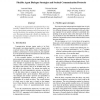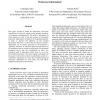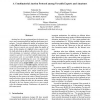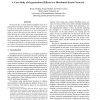ATAL
2004
Springer
14 years 5 months ago
2004
Springer
We propose an argumentation-based framework for representing communication theories of agents that can take into account dialogue strategies and society protocols in a way that fa...
ATAL
2004
Springer
14 years 5 months ago
2004
Springer
This paper presents a model for integrative, one-to-one negotiation in which the values across multiple attributes are negotiated simultaneously. We model a mechanism in which age...
ATAL
2004
Springer
14 years 5 months ago
2004
Springer
In an open system, multi-agent computations must compete for resources required for satisfying their goals. We describe CyberOrgs, a hierarchical model for acquisition and control...
ATAL
2004
Springer
14 years 5 months ago
2004
Springer
Auctions have become an integral part of electronic commerce and a promising field for applying multi-agent technologies. Correctly judging the quality of auctioned items is ofte...
ATAL
2004
Springer
14 years 5 months ago
2004
Springer
Combinatorial auctions, where agents can bid on bundles of items (resources, tasks, etc.), are desirable because the agents can express complementarity and substitutability among ...
ATAL
2004
Springer
14 years 5 months ago
2004
Springer
We describe how a system employing different types of organizational techniques addresses the challenges posed by a large-scale distributed sensor network environment. The high-le...
ATAL
2004
Springer
14 years 5 months ago
2004
Springer
As the science of multi-agent systems matures, many developers are looking to deploy mission critical applications on distributed multi-agent systems (DMAS). Due to their distribu...
ATAL
2004
Springer
14 years 5 months ago
2004
Springer
For Peer-2-Peer (P2P) networks to realize their full potential their nodes need to coordinate and cooperate, to improve the performance of the network as a whole. But this requires...
ATAL
2004
Springer
14 years 5 months ago
2004
Springer
Overhearing is gaining attention as a generic method for cooperative monitoring of distributed, open, multiagent systems. It involves monitoring the routine conversations of agent...
ATAL
2004
Springer
14 years 5 months ago
2004
Springer
In open distributed multi-agent systems, agents often coordinate using standardized agent communications. Thus, representing agent conversations is an important aspect of multi-age...




